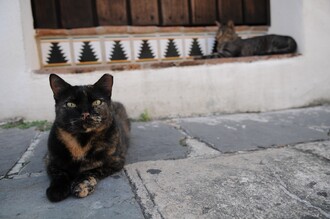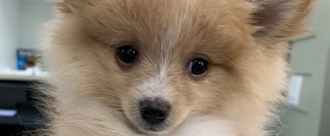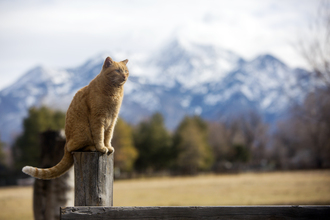-
Los Ángeles apoya a su comunidad y a sus gatosCasi 10 años después de que el Consejo Municipal de Los Angeles votaron para hacer de la ciudad una comunidad donde no se matan a perros o gatos innecesariamente, la lucha continúa. Aunque el umbral del 90% se alcanzó para los perros hace cuatro años, los esfuerzos para salvar vidas de los gatos han sido mucho más desafiantes. Sin embargo, un programa actualmente en consideración probablemente empujaría a Los Angeles a la cima. La mayor barrera para salvar a más gatos ha sido una orden judicial que impide a la Ciudad de participar en los programas de CES (Capturar, Esterilizar y Soltar). Como resultado, la cantidad de gatitos que ingresan a los refugios de Los Angeles, a aumentando en los últimos años, agotando los recursos disponibles. El mes pasado, la Ciudad público los detalles de su tan esperado programa para gatos de la ciudad, que asigna fondos para la esterilización de 20,000 gatos que deambulan libremente al año, además de los fondos ya asignados para las mascotas de los residentes. El proceso es simple: los gatos son capturados, evaluados por veterinarios, esterilizados, vacunados y devueltos a su comunidad. Esto promete ser un cambio de juego sin obstaculizar ninguno de los avances ya realizados -- revocando la orden judicial y allanando el camino para que Los Ángeles se convierta en la comunidad más grande del país en donde no se matan a perros y gatos innecesariamente.124 de 200 FirmasCreado por Carol R.

-
Stop Puppy Mill Sales in HoustonIn Austin, El Paso, Fort Worth, The Colony, Waco and more than 375 other cities, counties and states have already passed laws to ban the retail sale of pets sourced from commercial breeding facilities. It's time for Houston to do the same. Puppy and kitten mills are in business to supply pet stores. The pets in these facilities often spend their entire lives in dirty, crowded cages for the sole purpose of producing as many animals as possible for the retail pet trade. Pet stores that obtain animals from these facilities are not an asset to our city. These facilities also produce puppies that are often sick, causing unsuspecting consumers to have to care for a new pet in need of expensive veterinary treatment. Milled puppies can also spread campylobacter, a dangerous, drug-resistant bacteria that is contagious to humans. Recently, the Centers for Disease Control and Prevention (CDC) traced a multi-state outbreak of Campylobacter to pet store puppies. This is a public health risk in a time where public health should be a top priority. A retail pet sales ban will not prevent pet stores from doing business, but it will reduce the burden on our shelters and rescue groups by increasing pet adoptions. It will also benefit our local hobby breeders by allowing them to continue providing responsibly bred animals directly to those who cannot find what they are looking for through adoption. Please consider passing a humane pet store ordinance for Houston.290 de 300 FirmasCreado por Aleesia W.

-
Protect Alaska's community catsHelp support saving the lives of community cats by advocating for lifesaving programs in your area. Please sign and share this petition to show that you support safe, humane and positive solutions for cats living in your community. Current state rules and regulations severely hamper any lifesaving efforts focused on community cats. Alaska's Board of Game has been considering rule changes that could impact cats and the people who care for them. These changes have been pushed to early 2022. Alaska’s residents deserve TNVR (trap-neuter-vaccinate-return) programs, which are animal-friendly, cost-effective, and reduce the burden and bureaucracy placed on the state’s animal shelters. The process is simple: Community cats are trapped, evaluated by veterinarians, vaccinated, spayed or neutered, ear-tipped, and returned to their outdoor homes, unable to have kittens. The simple truth is that current methods of animal control relative to community cats are expensive, ineffective and often inhumane. Rule changes allowing TNVR programs would be better for the cats, for public health and for the wildlife we all want to protect.636 de 800 FirmasCreado por Keiko B.
-
End euthanasia for straysDear Mayor, City Council Members, County Commissioners, and Community Leaders, I am writing to explain why ending the euthanasia of stray dogs and expanding animal welfare infrastructure in Tyler and Smith County is not only important—but essential to the health, values, and future of our community. First and foremost, this is a moral issue. Our stray dogs are being euthanized because there is not enough space, funding, or coordination to care for them. This places the burden of systemic shortcomings on the animals themselves. A compassionate community does not solve capacity problems by ending lives—it solves them by investing in solutions. Second, euthanasia as population control is ineffective and costly. Killing our stray dogs does not reduce intake long-term. Without adequate spay/neuter programs, foster networks, and shelter capacity, the cycle simply repeats. Communities that invest in no-kill infrastructure consistently see lower intake numbers, reduced operating costs over time, and stronger public support. Third, expanding Smith County Animal Control and supporting no-kill shelters directly improves public safety. Properly resourced facilities allow for better disease control, behavioral assessment, reunification with owners, and adoption services. Overcrowded, underfunded systems increase risk—to animals, staff, and the public. Fourth, Tyler’s reputation and economic vitality are affected by how we treat animals. Cities known for humane animal policies attract residents, businesses, volunteers, and tourists. Conversely, widespread euthanasia damages public trust and discourages civic engagement. Animal welfare is increasingly seen as a reflection of a community’s overall quality of life. Fifth, local no-kill shelters and rescues cannot shoulder this responsibility alone. These organizations already operate with limited funding, volunteers, and space. Without meaningful financial and logistical support from city and county leadership, they are being asked to compensate for gaps that only government investment can realistically fill. Finally, this issue matters because solutions exist. Communities across Texas have successfully transitioned to no-kill models through expanded shelter capacity, foster-based programs, rescue partnerships, and prevention-focused services. Tyler and Smith County are capable of the same progress with commitment and leadership. Ending the euthanasia of our stray dogs is not an emotional or unrealistic demand—it is a practical, humane, and responsible goal. Expanding infrastructure is an investment that saves lives, protects public health, and aligns our policies with the values of compassion and accountability. I urge you to recognize the importance of this issue and take meaningful action to ensure that Tyler becomes a community where solutions replace suffering, and leadership replaces resignation. Respectfully, Kim Aguilar1 de 100 FirmasCreado por Kim A.
-
Transform Beaconsfield City PoundBeaconsfield est une ville compatissante certifiée PETA. Les chiens perdus sont généralement amenés directement au domicile du tuteur. Cependant, si le tuteur ne peut pas être trouvé tout de suite, le chien est placé dans une petite cage dans un petit bâtiment de stockage qui est interdit au public. Les animaux ne sont pas des objets perdus et doivent être traités comme des êtres sensibles, pas comme des biens. Ce bâtiment se trouve juste à côté de la bibliothèque, mais se trouve derrière une clôture couverte et n'a pas de signalisation. Bien que les animaux ne soient jamais euthanasiés (ils sont envoyés dans un refuge sans tuer à l'extérieur de la ville s'ils ne sont pas réclamés), ils méritent toujours mieux lorsqu'ils sont perdus à Beaconsfield. Et Beaconsfield a besoin d'un abri qui peut amener tous les animaux de compagnie perdus, et fournir un triage et un transport vers un refuge pour la faune. Plusieurs résidents se sont plaints de ne pas pouvoir trouver un centre d'admission ouvert pour un lapin sauvage qui a été abattu par la flèche d'un braconnier. (Lincoln Rabbit a heureusement été sauvé par Sauvetage Lapins Errant et Refuge Lobadinaki). Nous aimerions que la ville de Beaconsfield cesse d'utiliser le bâtiment de stockage et travaille plutôt avec un refuge sans tuers but non lucratif pour fournir des services aux animaux. https://m.facebook.com/groups/2477666815954860/?ref=share Beaconsfield is a PETA certified Compassionate City. Lost dogs are usually brought right to the guardian’s home. However, if the guardian can not be found right away, the dog is placed in a tiny cage in a small storage building that is off limits to the public. Animals are not lost items and should be treated as sentient beings, not property. This building is right next to the library, but is behind a covered fence, and has no signage. While the animals are never euthanized (they are sent to a no kill shelter outside the city if unclaimed), they still deserve better while lost in Beaconsfield. And Beaconsfield needs to have a shelter that can bring in all lost pets, and provide a triage and transport to a refuge for wildlife. Several residents complained that they could not find an open admission facility for a wild rabbit who was shot by a poacher’s arrow. (Lincoln Rabbit was thankfully saved by Sauvetage Lapins Errant and Refuge Lobadinaki). We would like the City of Beaconsfield to stop using the storage building, and instead work with a no kill not for profit shelter to provide animal services.2 de 100 FirmasCreado por Nicole C.

-
Let volunteers in at Warren Billhartz Animal Shelter in Collinsville, ILIt is time for change at our Collinsville animal shelter. A great first step would be the utilization of volunteers at that location. Signing this petition would hopefully open the door to a more transparent experience at the shelter. As it stands, potential adopters can only view an animal by appointment. Utilizing volunteers would allow for people to come in and view animals at any time the shelter was open. The system is so broken and outdated that very few people will run the gauntlet of rules that currently exist, to view and adopt a pet. As a direct result of this, very few animals are adopted out in a calendar year and most spend much more time waiting for a family than is necessary. A recent story is that a older cat was found wandering with a collar and leash attached. A concerned citizen dropped him off at the shelter. After 5 days I called to try and adopt him. I was met with nothing but resistance and was told that he (the person who answered my call) wasn't in charge of that area. To put this in perspective the shelter is very small and there are only 2 employees. They rarely have more than 10 cats and this cat was brand new to them. The call ended with him telling me that the only way I could find out if they still had this kitty was to wait and hope they put him on their Facebook page the following week. Volunteers are needed at this location not only to create a welcoming experience but to be able to actually work to get an animal adopted.276 de 300 FirmasCreado por Brenda H.
-
Stop Puppy Mill Sales in Little RockMore than 440 other cities, counties and states have already passed laws to stop the retail sale of pets sourced from commercial breeding facilities. It's time for our community to do the same. Puppy and kitten mills are in business to supply pet stores. The pets in these facilities often spend their entire lives in dirty, crowded cages for the sole purpose of producing as many animals as possible for the retail pet trade. Pet stores that obtain animals from these facilities are not an asset to our community. These facilities also produce puppies that are often sick, causing unsuspecting consumers to have to care for a new pet in need of expensive veterinary treatment. Milled puppies can also spread campylobacter, a dangerous, drug-resistant bacteria that is contagious to humans. In the past several years, the Centers for Disease Control and Prevention (CDC) traced a multi-state outbreak of Campylobacter to pet store puppies. This is a public health risk in a time where public health should be a top priority. A humane pet sales ordinance will not prevent pet stores from doing business, but it will reduce the burden on our shelters and rescue groups by increasing pet adoptions. It will also benefit our local ethical hobby breeders by allowing them to provide responsibly bred pets directly to those who cannot find what they are looking for through adoption. Please consider protecting pets and consumers by passing a humane pet sales ordinance for our community.105 de 200 FirmasCreado por Shannon f.
-
Against Animal Euthansia Montgomery CountyPlease work together to collaborate with creative ideas to save these animals from certain death any alternate solutions and ideas welcomed. Montgomery County residents have rallied together for change and support on many important issues in the past we can come together as a community to stop the proposal for the mass euthanasia of our furry residents as well they don't deserve a death sentence. Please sign to let Montgomery County Board members know euthanasia is not the solution.514 de 600 FirmasCreado por Shannon B.
-
Shelter Based Trap-Neuter-Vaccinate-Return ProgramWe are asking for support from our city to help this program grow into a much needed shelter based operation.62 de 100 FirmasCreado por Rebecca S.
-
RELEASE Louisiana DOGS from chains!The laws in Louisiana are heartless and outdated. There was a time when dogs were viewed in the same light as livestock. Due to the latest studies, we now know that dogs have evolved into a companion breed to man who have feelings and even emotions. They deserve to be treated humanely. Living at the end of a chain, or a short tether is unacceptable. Dogs deserve for humans to speak up for them. They are incapable of knocking on your door and asking for help. They suffer in silence. Be the voice of the dogs who are the most loyal companions humans have.33 de 100 FirmasCreado por Cindy S.
-
Stop The Sale of Dogs, Cats, and Rabbits in Our CommunityMore than 440 other cities, counties and states have already passed laws to stop the retail sale of pets sourced from commercial breeding facilities. It's time for our community to do the same. Puppy, kitten, and rabbit mills are in business to supply pet stores. The pets in these facilities often spend their entire lives in dirty, crowded cages for the sole purpose of producing as many animals as possible for the retail pet trade. Pet stores that obtain animals from these facilities are not an asset to our community. These facilities often produce puppies. kittens, and rabbits that are often sick, causing unsuspecting consumers to have to care for a new pet in need of expensive veterinary treatment. Milled puppies can also spread campylobacter, a dangerous, drug-resistant bacteria that is contagious to humans. In the past several years, the Centers for Disease Control and Prevention (CDC) traced a multi-state outbreak of Campylobacter to pet store puppies. This is a public health risk in a time where public health should be a top priority. A humane pet sales ordinance will not prevent pet stores from doing business, but it will reduce the burden on our shelters and rescue groups by increasing pet adoptions. It will also benefit our local ethical hobby breeders by allowing them to provide responsibly bred pets directly to those who cannot find what they are looking for through adoption. Please consider protecting pets and consumers by passing a humane pet sales ordinance for our community.193 de 200 FirmasCreado por Natalie M.
-
TNR in Lebanon MOObviously, the biggest benefit of TNR is reducing the feral cat population. Since they can’t reproduce, the size of the colony shrinks over time. TNR also reduces nuisance behavior, such as fighting and spraying. The cats generally are healthier and less likely to spread diseases since they get vaccinated as part of the TNR process. The cats continued presence helps keep rodents under control. Trap-Neuter-Return is successfully practiced in hundreds of communities and in every landscape and setting. It is exactly what it sounds like: Cats are humanely trapped and taken to a veterinarian to be neutered and vaccinated. After recovery, the cats are returned to their home—their colony—outdoors. Kittens and cats who are friendly and socialized to people may be adopted into homes. Grounded in science, TNR stops the breeding cycle of cats and therefore improves their lives while preventing reproduction. It is a fact that the removal and killing of outdoor cats that animal control has been pursuing for decades are never-ending and futile. Since feral cats are not adoptable, they are killed in pounds and shelters. With a successful program like Trap-Neuter-Return to turn to, it’s hard to believe that animal control agencies continue to kill cats, even though that approach has shown zero results. It is time to put an end to catch and kill. Trap-Neuter-Return provides a life-saving, effective solution for these beautiful, independent cats. Colonies that are involved in TNR diminish in size over time. During an 11-year study of TNR at the University of Florida, the number of cats on campus declined by 66%, with no new kittens being born after the first four years of operation. A study of the impact of TNR on feral cat colonies in Rome, Italy, also observed colony size decrease between 16% and 32% over a 10-year period. Trap-Neuter-Return quickly stabilizes feral cat populations by instantly ending reproduction and by removing socialized cats from the colony. A TNR program at Texas A&M University neutered 123 cats in its first year and found no new litters of kittens the following year. Over the course of the same study, 20% of the cats trapped were found to be socialized stray cats and adopted. I personally worked with Allied Cats of Columbus in Columbus, GA, where I saw the benefits of the reduction of cats being euthanized by animal control and a decrease in the adoptions.121 de 200 FirmasCreado por Lea'Ona L.



.jpg)